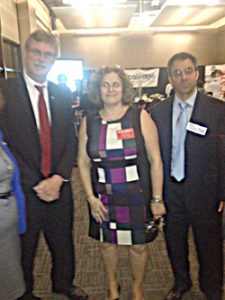The city of Niagara Falls is living on borrowed time, financially speaking.
The unrestricted fund balance (aka reserve fund) is projected to sink to zero by the end of this year, and according to a draft audit released in August by State Comptroller Thomas DiNapoli’s office and first made public two weeks ago on the Niagara Falls Reporter website, the city of Niagara Falls “will nearly deplete the remaining casino revenue by the end of the 2018 fiscal year.”
In response to this worrisome news, Standard and Poor’s last month dropped the city’s credit rating to BBB+, just three ticks above speculative grade.
It’s almost unheard of for a city to have its bonds rated speculative, or as “junk bonds.” In fact, only 25 of over 7,800 municipalities nationwide share this ignominious status, including basket cases Detroit, MI and Camden, NJ.
And how are Niagara Falls Mayor Paul Dyster and his “rubber stamp” City Council dealing with this dire situation, grappling with their city’s budgetary challenges? Why, by handing out raises to all of his department heads, that’s how!
Appearing as Item 17 on the Niagara Falls City Council agenda for next week’s regular September 18, 2017 meeting is a resolution to amend Chapter 171 of the Codified Ordinances entitled “Benefits of Employees not Covered by Collective Bargaining Agreements.” The resolution is being jointly sponsored by Councilmembers Touma, Grandinetti, Walker and Scott, Councilmember Tompkins excluded.
The amendments impact those classified as “exempt” employees, or full-time, non-union, non-seasonal and not members of any City board or commission. Examples would include Bryan Dalporto, Chief of Police, Fire Chief Thomas Colangelo and City Planner Thomas DeSantis.
Starting as a one-time installment two weeks ago, on Sept. 1, and repeated on Jan. 1 every year through 2025, is a 2% raise in base salary for the Dyster administration staffers.
The inflation rate for the United States was 1.7% for the 12 months ended July, 2017.
So Mayor Dyster, in the face of his city’s rapidly deteriorating financial position, spending down its reserve fund, earning reprobation from New York State’s top fiscal watchdog DiNapoli and watching casino revenue disappear into thin air, is granting raises to his inner circle to the tune of 18%, compounded, over the next seven years. With the complicity of his City Council majority, of course.
It’s almost as if Mayor Dyster is practically begging for a control board to move in and set up shop here.
“But wait!” as they say on late-night infomercials, “There’s more!”
Longevity payments, or additional wages or bonuses given based on length of service, are also slated for improvident increases for these officials. The payment for having worked ten years is being more than doubled.
More than doubled.
The previous ten year longevity payment was $750. It will be upped to $1750, if Councilmembers Touma, Grandinetti, Walker and Scott vote “Yea” on Monday which, since they sponsored the resolution, they most certainly will.
Concomitantly, the 15, 20, 25 and 30-year longevity payments will all be increased by $1000 each. For example, the 30-year longevity payment will increase from $2250 to $3250.
Compensation for accumulated sick leave presents another opportunity for Dyster et al. to ingratiate themselves to the lucky few who hold secure government jobs under them.
Piling up sick days at the rate of one per month is somewhat standard for most who work in the public sector. Until now, city employees were reimbursed for unused sick time at the rate of 20% (1-99 days), 40% (100-199 days) and 60% (200 and over). After Monday, it will be a flat percentage of 50%.
So if you never call in sick and stack up your 12 sick days a year, and then separate from city employment anywhere from the mandatory 3 years (when the benefit kicks in) to 8 years, 3 months, the money you will receive for accumulated sick time will be more than doubled.
More than doubled.
If you work from 8 years, 3 months to 16 years, 6 months, you still get more money. The minuscule number of city employees who stick it out more than 16.5 years will see a nominal 10% cut. If it’s consistent with the increases in longevity and base pay, we’re guessing that, in the final analysis, this is another splash of red ink.
What’s most surprising about all of this is that Councilmembers Touma and Grandinetti appear to be giving away the store less than two months before they have to stand for re-election. Or is it a winning strategy on their part?
After all, in an off-year election, in a city where only a small percentage of eligible voters bother to show up at the polls, the friends, family and acquaintances of the couple hundred or so exempt employees can add up. That could make all the difference in a closely-contested election for the three Council seats that will be decided come November.




















